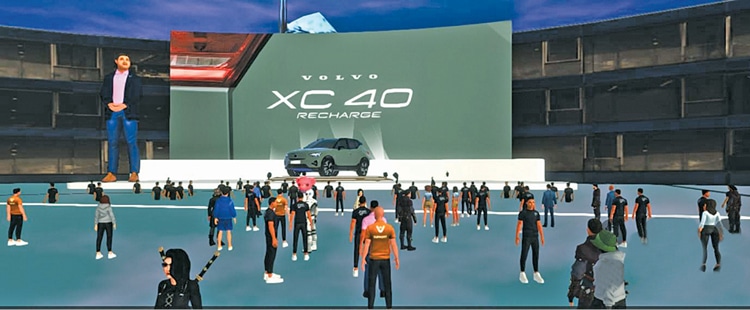According to a recent report from global market research firm Technavio, the metaverse real estate market share is expected to increase by $5.37 billion from 2021 to 2026, despite the possibility of growth momentum decelerating. They attribute this growth to the increasing popularity of mixed reality and cryptocurrency.

Another month of everyone trying to find their space in the metaverse—developers trying to up their game, enterprises showing off their initiatives, universities working hard to create a metaverse-capable generation, investors trying to make money, and more! Understandably, governments around the world are in a real dilemma—unable to discern whether this ‘disruptive’ force is here to stay or a passing fad, whether the crypto craze is good or bad, whether to tighten or loosen their hold, and whether they really have any control over something they cannot entirely see!
US senators, for instance, are trying to pass a bill in the Senate to eliminate taxes on crypto transactions up to $50. “While digital currencies have the potential to become an ordinary part of Americans’ everyday lives, our current tax code stands in the way,” said a Republican senator, “The bill will let people use cryptocurrencies more easily as an everyday method of payment by exempting from taxes small personal transactions like buying a cup of coffee.”
Currently, if someone sells virtual currency, they must recognise any capital gain or loss on the sale. The bill sees this as a roadblock to crypto adoption, and seeks to exempt smaller transactions from taxes. Yet, there is the risk of hackers and criminal organisations making use of potential loopholes in this bill to transfer drug money or stolen cryptos!
| Developing Open Standards for the Metaverse |
| For 22 years now, the Khronos Group has been silently working on open standards for a range of technologies that help build the metaverse, including 3D graphics, parallel computation, vision acceleration, VR, AR and ML. In June this year, it launched the Metaverse Standards Forum, together with big names like Meta, Microsoft, NVIDIA, Qualcomm, OpenAR Cloud, the Open Geospatial Consortium, the World Wide Web Consortium, and so on. The forum attracted close to 1000 members within a month. The forum, hosted by Khronos, is open to any company, standards organisation, or university at no charge. The activities of the forum will be directed by the needs and interests of its members, and will hopefully cover the entire spectrum of technologies needed by the metaverse, including 3D assets and rendering, AR and VR, user created content, avatars, identity management, privacy, legal issues and financial transactions. To know more, or to join the forum. |
In a recent tweet, Alex Bornyakov, Deputy Minister of Digital Transformation of Ukraine, noted that crypto is essential for Ukraine’s defence. “Despite the ‘bear market,’ crypto has become an essential tool of Ukraine’s defence, providing flexibility and speed that literally saved our soldiers’ lives. Every crypto winter leads to a crypto spring, but the industry is here to stay,” he wrote.
According to various media reports, since the beginning of the Russia-Ukraine war, Ukraine has raised over $135 million through crypto donations. Various artists and organisations have also helped the country raise funds through the sale of non-fungible tokens (NFTs). Ukraine’s Meta History Museum of War platform, for example, raised $1.3 million from NFT sales. The government hopes to use the fund to restore the destroyed physical monuments in the country.
India, on the other hand, is not much in favour of cryptocurrencies. Earlier this year, the Finance Minister announced the imminent launch of the digital rupee—a digital equivalent of the Indian rupee. But this is not to be confused with unregulated cryptocurrencies.
While fielding questions on the regulation of crypto, in the Lok Sabha in July, Finance Minister Nirmala Sitharaman said the government would need international consensus and collaboration to implement any legislation on cryptocurrencies. “In view of the concerns expressed on the destabilising effect of cryptocurrencies on a country’s monetary and fiscal stability, the RBI has recommended framing legislation on this sector. The RBI believes that cryptocurrencies should be prohibited,” she said. Since cryptocurrencies are technically borderless, efforts to regulate or ban them will be effective only if there is a global scale evaluation, collaboration, and consensus.
In a recent media interview, Subhash Chandra Garg, former Finance and Economic Affairs Secretary, expressed his opinion that the cloud around crypto can be removed through proper dialogues between the industry and the government. “So far only the Reserve Bank of India (RBI) has shown a sort of distress about cryptocurrency. There is no opposition in the system against blockchain or other technologies. RBI is a reasonably powerful institution in the country. There is a lurking suspicion about ‘crypto-thing.’ This made the government take a more sledge-hammer approach. If the government goes and tries to kill crypto, we all will be losers. But this discomfort can only be removed when a dialogue takes place between the industry and the Centre,” he said.
The government’s pessimistic view of cryptocurrencies is also understandable. There is no way to judge the true value of cryptocurrencies, and there is a real concern about it being used by unscrupulous people to transact even huge sums of money without the government’s knowledge. This can be used to fund drugs and terrorism, and can eventually even destabilise an economy. Looks like we have to wait for a global consensus on this. Till then, take it all with a pinch of salt.
Here is a quick round-up of some interesting metaverse-related developments…
Automakers in the metaverse
Some automakers like Mahindra & Mahindra were early birds in the metaverse. July saw a few more carmakers, like Suzuki and Volvo, planting their foot firmly in this new world.
Maruti Suzuki India launched the NEXAverse, a metaverse initiative to take its premium cars to the tech-savvy generation, and unveiled the Grand Vitara in it. This enables users to experience the made-in-India, mid-size sport utility vehicle (SUV) in a 3D virtual space. Maruti claims it is the first carmaker in the world to let users book their car through the metaverse platform itself.
Soon after, Volvo Cars launched the XC40 Recharge, a pure electric, locally-assembled luxury car, on VolvoVerse, its new metaverse platform. It was an exclusive metaverse launch, conceptualised by Mindshare India. The car will be sold only online and is available for booking on the company’s website. This move is believed to be in line with the company’s sustainability goals.
Metaverse one of the fastest growing verticals for Tech Mahindra
Tech Mahindra announced its metaverse practice in February this year. While releasing their Q1FY23 results in July, the company revealed that metaverse turned out to be one of their fastest growing verticals.
“We are already working on about 60 projects globally, for 25 customers. They are coming from edtech, retail, automotive deal management, repair and maintenance of cars—we are seeing different kinds of customer base but it is clearly one of our fastest growing verticals,” said C.P. Gurnani, CEO and MD, Tech Mahindra, at the press meet.

Metaverse real estate market on a growth path
According to a recent report released by global market research firm Technavio, the metaverse real estate market share is expected to increase by $5.37 billion from 2021 to 2026, despite the possibility of growth momentum decelerating. They attribute this growth to the increasing popularity of mixed reality and cryptocurrency.
Mixed reality (MR) makes virtual reality more readable using tags and annotations. This widens the range of applications, and the user base as well. Plus, the growing uses of cryptocurrencies in purchasing digital assets is also creating an interest in end-users and enterprises. Cryptocurrencies make it easier to buy and sell virtual real estate.
“The metaverse real estate market share growth by the enterprise segment will be significant for revenue generation. With an increase in the number of big giants such as Nike, Facebook, and Microsoft entering the virtual world, the metaverse real estate market has started to flourish. The advent of Web 3.0 is another major factor driving the growth of the enterprise end-user segment,” says the report.
People may buy real estate on metaverse platforms, not just for their own use but also as an investment—to sell or lease to others. On the other hand, one of the biggest challenges is the uncertainty of real estate market price on the metaverse. Since the dynamics of demand, pricing and valuation of real estate in the metaverse is quite different from the physical world, it is difficult to judge the profitability of investments. This may discourage such price-sensitive consumers.
Meta vs Apple
Although Apple remarked earlier this year that it sees a lot of potential in the metaverse and is making suitable investments, we do not know the details of what exactly the company is planning. Nevertheless, Meta CEO Mark Zuckerberg seems to be locking horns with Apple already.
According to The Verge, Zuckerberg remarked in an internal meeting that Meta is in a “deep, philosophical competition” with Apple. He said, “This is a competition of philosophies and ideas, where they believe that by doing everything themselves and tightly integrating that, they build a better consumer experience.”
He supposedly told Meta employees that the company is competing with Apple and will try to position itself as a more open and cheaper option than Apple. However, the prices of Meta’s VR headsets are up by a $100, quite contrary to his messaging.
Dubai to give the metaverse a boost, and vice versa
The Crown Prince of Dubai, Sheikh Hamdan, announced the Dubai Metaverse Strategy, which aims to make the city one of the world’s top ten metaverse economies. He said the metaverse would support 40,000 virtual jobs and add $4 billion to Dubai’s economy in five years.
A committee chaired by Hamdan will supervise the implementation of strategies related to the digital economy and future technologies in Dubai, identify and develop the required skills, advise the economic sectors on the emerging digital economy, attract international companies and conferences, and build strategic partnerships with leaders in this space. The committee will also design policies for new technologies like the metaverse, AI, blockchain, Web3, VR/AR, data centres, and cloud computing.
Skill up for metaverse job openings
According to specialist staffing firm Xpheno, there were around 55,000 job openings related to the metaverse in the beginning of July. These were spread across various skills like artificial intelligence (AI) and machine learning (ML), virtual and augmented reality (VR and AR), gaming, user interface and user experience (UI/UX) designing, blockchain and cryptocurrency, security, and so on.
There are not enough engineers to create this whole new world, so companies are also wooing the soft-skilled, like designers and content writers. Companies like MindTree, for example, are hiring across the ecosystem—designers, 3D artists, blockchain specialists, game developers, voice based cognitive developers, solution architects, integrators, data specialists, AI, Internet of Things (IoT) and geospatial architects, and more.
It is time for developers to fortify their tech skills with an understanding of the evolving dynamics of this new world—right from blockchain and cryptocurrency to privacy and the legalities.
Learn about the metaverse from top universities
The University of Pennsylvania’s Wharton School is the first Ivy League business school to launch a certification in the metaverse. ‘Business in the Metaverse Economy’ is a six-week programme at Wharton developed in collaboration with Prysm Group, a firm specialising in the economics of blockchain, digital assets, and the metaverse.
It will be asynchronous and online, and the first batch starts this month. The curriculum will cover AR and VR, cryptocurrencies, NFTs, blockchain, and more, through lectures, case studies and practical use of the technologies.
The University of Tokyo has also said that it will launch a series of courses later this year to cover the fundamentals of metaverse technologies. The courses will be set up by the university’s faculty and will address a wide audience ranging from high school students to working professionals.
It will enable students to explore new career paths opened by the metaverse and provide an opportunity for professionals to reskill themselves to handle digital transformation. The courses will combine online and offline classes with practical learning. Certificates will be issued on completion of the courses.
Janani G. Vikram is a freelance writer based in Chennai, who loves to write on emerging technologies and Indian culture. She believes in relishing every moment of life, as happy memories are the best savings for the future









